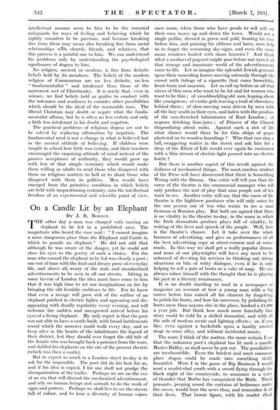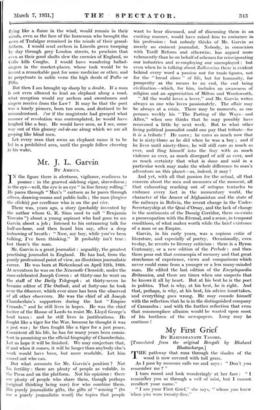On a Candle Lit by an Elephant
BY J. B. MORTON. THE other day a man was charged with causing an elephant to be led in a prohibited area. The magistrate who heard the ease said : " I cannot imagine a more dangerous place than the Elephant and Castle in -which to parade an elephant." He did not add that although he was aware of the danger, yet he could not close his eyes to the poetry of such a choice. For the man who caused the elephant to be led was clearly a poet ; one out of tune with the drab and dreary prose of everyday life, and above all, weary of the stale and standardized advertisements to be seen in all our streets. Sitting in some tavern of London the idea must have come to him that it was high time to set our imaginations on fire by bringing the old heraldic emblems to life. For he knew that even a savage will grow sick of the outline of an elephant pricked in electric lights, and appearing and dis- appearing with deadly regularity every evening, and will welcome the sudden and unexpected arrival before his eyes of a living elephant. My only regret is that the poet was not able to have a castle built, with broad battlements round which the monster could walk every day, and so keep alive in the hearts of the inhabitants the legend of their district, lest they should ever forget the old tale of the Asiatic who was brought back a prisoner from the wars, and stabled his elephants on the site of the present theatre (which was then a castle).
But to expect so much in a London street to-day is to ask for the impossible. The poet did do his best for us, and if his idea is copied, I for one shall not grudge the disorganization of the traffic. Perhaps we are on the eve of an era that will discard the mechanized advertisement, and rely on human beings and animals to do the work of signs and posters. Perhaps we shall live to see the streets full of colour, and to hear a diversity of human voices once more, when those who have goods to sell will cry their own wares up and down the town. Would not a single pedlar, dressed in green and gold, bearing his tray before him, and praising his ribbons and laces, soon help us to forget the screaming sky-signs, and even the enor- mous windows loaded with sham luxuries ? And think what a mediaeval pageant might pass before our eyes if all that strange and inanimate world of the advertisements came to life. Let us imagine the splendid. Jewish generals upon their caracoling horses moving solemnly through the crowd with tidings of a cigarette that cures bronchitis, heart-burn and anaemia. Let us call up before us all that circus of thin men who want to be fat and fat women who want to be thin ; of swashbuckling old men leaping about like youngsters; of exotic girls leaving a trail of chocolates behind them ; of slow-moving oxen driven by men with all the lazy south in their eyes, and laden with the produce of the sun-drenched laboratories of East • London ; of negroes drinking lime-juice ; of Princes of the Church rhapsodizing about socks. Against such a riot of life what chance would there be for thin strips of paper plastered on to wooden hoardings ? , Who that can stop a tall, swaggering waiter in the street and ask him for a drop of the Elixir of Life would ever again be contented with a thin stream of electric light poured into an electric bottle ?
But there is another aspect of this revolt against the dullness of mechanical things. The most careless student of the Press will have discovered that there is Something Wrong with the Drama. One critic will tell you that the curse of the theatre is the commercial manager who will only produce the sort of play that nine people out of ten want to see. Another critic will say that the curse of the theatre is the highbrow producer who will only cater for the one person out of ten who wants to see a . mad German or Russian play. But both are agreed that there is no vitality in the theatre to-day, in the sense in which the Irish dramatists produce plays full of vitality, by writing of the lives and speech of the people. Well, here is the theatre's chance. Let it take over the whole business of advertising, and give us performances of all the best. advertising copy at street-corners and at cross- roads. In this way we shall get a really popular drama, and none of our playwrights will have any need to be ashamed of devoting his services to thinking out strong situations or bits of witty dialogue, even if he is only helping to sell a pair of boots or a cake of soap. He can always solace himself with the thought that he is playing his part in a literary renaissance.
It is no doubt startling to read in a newspaper or magazine an account of how a young man with a big career before him ruined all his chances by forgetting to polish his boots, and how his successor, by polishing his boots more than anyone else in the place, hooked a £1,000 a year job. But think how much more forcefully that story could be told by a skilled dramatist, and with all the aids of modem scenic and lighting effectg ; or, if you like, even against a backcloth upon a hastily erected stage in some alley, and without incidental music.
The more I think of the matter, .the more certain I am that the unknown poet's elephant has lit such .a candle, Master Ridley, as shall never be put out. The possibilities arc inexhaustible. Even the briefest and most common- place slogan could be made into something richly beautiful. Were I in the game of Big Business I would send a scarlet-clad youth with a sword flying through the black night of the countryside, to announce in a voice of thunder that Motho has vanquished the Moth. Timid peasants, peeping round the curtains of bedrooms under the eaves, would hear the news thus, and remember it all their lives. That heroic figure, With his scarlet cloak flying like a flame in the wind, would remain in their minds, even as the face of the horseman who brought the news of Trafalgar remained in the minds of their grand- fathers. I would send archers in Lincoln green trooping by day through grey London streets, to proclaim that even as their good shafts slew the enemies of England, so Coffo kills Coughs. I would have wandering ballad- singers in the market-places, whose task would be to invent a remarkable past for some medicine or other, and to perpetuate in noble verse the high deeds of Puffo or Piffo.
But then I am brought up sharp by a doubt. If a man is not even allowed to lead an elephant along a road, what reception would my archers and swordsmen and singers receive from the Law ? It may be that the poet was a lonely pioneer, born too soon, and destined to be misunderstood. For if the magistrate had grasped what manner of revolution was contemplated, he would have laughed like a boy. He would have seen, as I see, some way out of this gloomy cul-de-sac along which we are all groping like blind men.
Let every man that owns an elephant cause it to be led in a prohibited area, until the people follow cheering in his wake.



























































 Previous page
Previous page